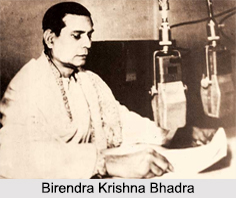 The contemporary version of the revolutionaries like Pankaj Mallick and Kavi Nazrul Islam, Birendra Krishna Bhadra was a radio broadcaster, playwright, actor, narrator and theatre director.
The contemporary version of the revolutionaries like Pankaj Mallick and Kavi Nazrul Islam, Birendra Krishna Bhadra was a radio broadcaster, playwright, actor, narrator and theatre director.
In the 1930s, when the All India Radio was established and used to be India"s national radio broadcaster, Birendra Krishna Bhadra worked there for several years. His rendition of the Mahishashura Mardini (1931) with his immaculate Sanskrit recitation that airs in the dawn of Mahalaya to this day after almost 8 decades is a true testament to his talent.
Early Life of Birendra Krishna Bhadra
Born in British India on 4th August, 1905, Birendra Krishna Bhadra was the son of Roy Bahadur Kalikrishna and Sarala Bala Devi, who also had another son named Bhupendra Krishna Bhadra. The family used to stay in a rented house in Ahiritola in north Kolkata but later shifted to Yogo Maya Devi"s house in 7, Ramdan Mitra Lane, it used to be Birendra"s grandmother"s house.
Fluent in 14 languages, Birendra"s father was a linguist and was employed as an interpreter in a lower court and later became a known figure in the Bengali literary circles. In 1927, he was awarded the title of Roy Bahadur. Birendra Krishna was also academically inclined and by 1926 he had passed his Intermediate and by 1928, he had graduated from Scottish Church College in Kolkata.
Career of Birendra Krishna Bhadra
During his time in the All India Radio, Birendra Krishna Bhadra had produced and adapted several plays and classics to produce as notable radio plays. In 1931, the Kolkata All India Radio started to broadcast a 2 hour long program called the Mahishashura Mardini, which described the epic battle between Goddess Durga and the demon king Mahishahura. The script of the program was written by Bani Kumar and the music was directed by Pankaj Mallik. The rich baritone of Birendra Krishna Bhadra brought the play to life and even to this day, it is played by All India Radio every Mahalaya, ushering the Durga Puja festivities.
Some of the other works of Birendra Krishna Bhadra included plays in Bengali theatre like the Mess No. 49, Blackout, Sat Tulsi (1940) and Sahib Bibi Gulam, which was a stage adaptation of the celebrated novel of Bimal Mitra. In 1952, he dramatised Subarna Golak written by Bankim Chandra Chattopadhyay, which was also later filmed in 1981. Birendra Krishna has also written screenplay for the Bengali film Nishiddha Phal (1955). His other works include:
Hitopadesa, 1948
Bisvarupa- Darsana, 1963
Rana- Berana, 1965
Bratakatha Samagra, 1985
Srimadbhagabata: Sampurna Dvadasa Skandha, with Upendracandra Sastri, 1990
Legacy of Birendra Krishna Bhadra
Birendra Krishna Bhadra"s version of the Mahishashura Mardini releases the spirit of celebration and festivities among the Bengalis and the show itself is associated with his voice. In 1975, when the voice of noted Bengali actor, Uttam Kumar was employed for the programme, it did not get a favourable response from the audience and it was shifted back to the original version of Birendra Krishna Bhadra.
In the 2019 Soumik Sen"s Bengali language movie Mahalaya, highlighted this 1975 fiasco, where actor Jisshu Sengupta portrayed the role of Uttam Kumar and Birendra Krishna Bhadra was portrayed by Subhasish Mukherjee.




